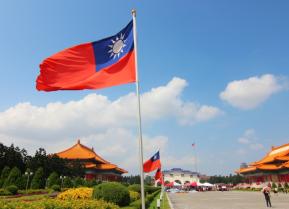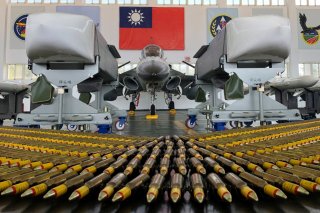All of the Bombs and Guns Taiwan Would Need to Fight China
China now spends twenty-five times more on its armed forces than Taiwan does.
If China invaded Taiwan, what would Taiwan need to do to repel such an invasion? Apparently, Taiwan has been studying that very question.
The Taiwanese government last year conducted a “deep analysis,” under the name “Joint Theater-Level Simulation System,” to determine what Taiwan would need to fend off such an attack.
The conclusion was that the Taiwanese military, in the event of an attack by a Chinese fleet, would need to sink half of the Chinese ships- which would require twelve hundred anti-ship missiles, which would take Taiwan years to obtain.
Taiwan had announced last May that it would spend $2.4 billion to buy four hundred one-hundred-mile-range Harpoon missiles from Boeing.
“The 400 Harpoons, fired by 100 truck-mounted quad-launchers supported by 25 mobile radars, would grow the Taiwanese anti-ship missile arsenal by half to 1,200 rounds. Locally-made Hsiung Feng II and Hsiung Feng III missiles and older Harpoon models would make up the balance,” the report said. “Assuming each missile has between a 50% and 70% chance of hitting its target—and also assuming Chinese bombardment destroys or suppresses a significant number of launchers—those 1,200 missiles should be sufficient to sink hundreds of Chinese ships and stop an invasion attempt cold, if Taipei’s calculations are sound.”
However, it will take until 2025 or 2026 for all of the trucks and missiles are in place.
The report also noted that China now spends twenty-five times more on its armed forces than Taiwan does.
“The sorts of survivable, low-profile and networked defenses that can survive an initial Chinese attack and be resilient and lethal for weeks or months,” Scott Harold, a RAND analyst, told Forbes.
Taiwan, also known as the Republic of China, is recognized by some countries as an independent nation, but China considers it part of China. Just this week, China declared its claim to Taiwan an “insurmountable red line.”
“The Chinese government has no room for compromise or concessions on the Taiwan issue,” China’s Foreign Minister Wang Yi said. “We urge the new U.S. administration to fully understand the high sensitivity of the Taiwan issue” and “completely change the previous administration’s dangerous practices of crossing the line” and “playing with fire.”
Adm. James Stavridis, the former Supreme Allied Commander of NATO wrote this week that the United States should view certain potential actions by China as “red lines” as well. These include nuclear, biological or chemical attacks on the United States or its allies, any attack on Taiwan, attacks on Japanese forces, other hostile actions in the South China Sea.
Stephen Silver, a technology writer for the National Interest, is a journalist, essayist and film critic, who is also a contributor to The Philadelphia Inquirer, Philly Voice, Philadelphia Weekly, the Jewish Telegraphic Agency, Living Life Fearless, Backstage magazine, Broad Street Review and Splice Today. The co-founder of the Philadelphia Film Critics Circle, Stephen lives in suburban Philadelphia with his wife and two sons. Follow him on Twitter at @StephenSilver.
Image: Reuters


